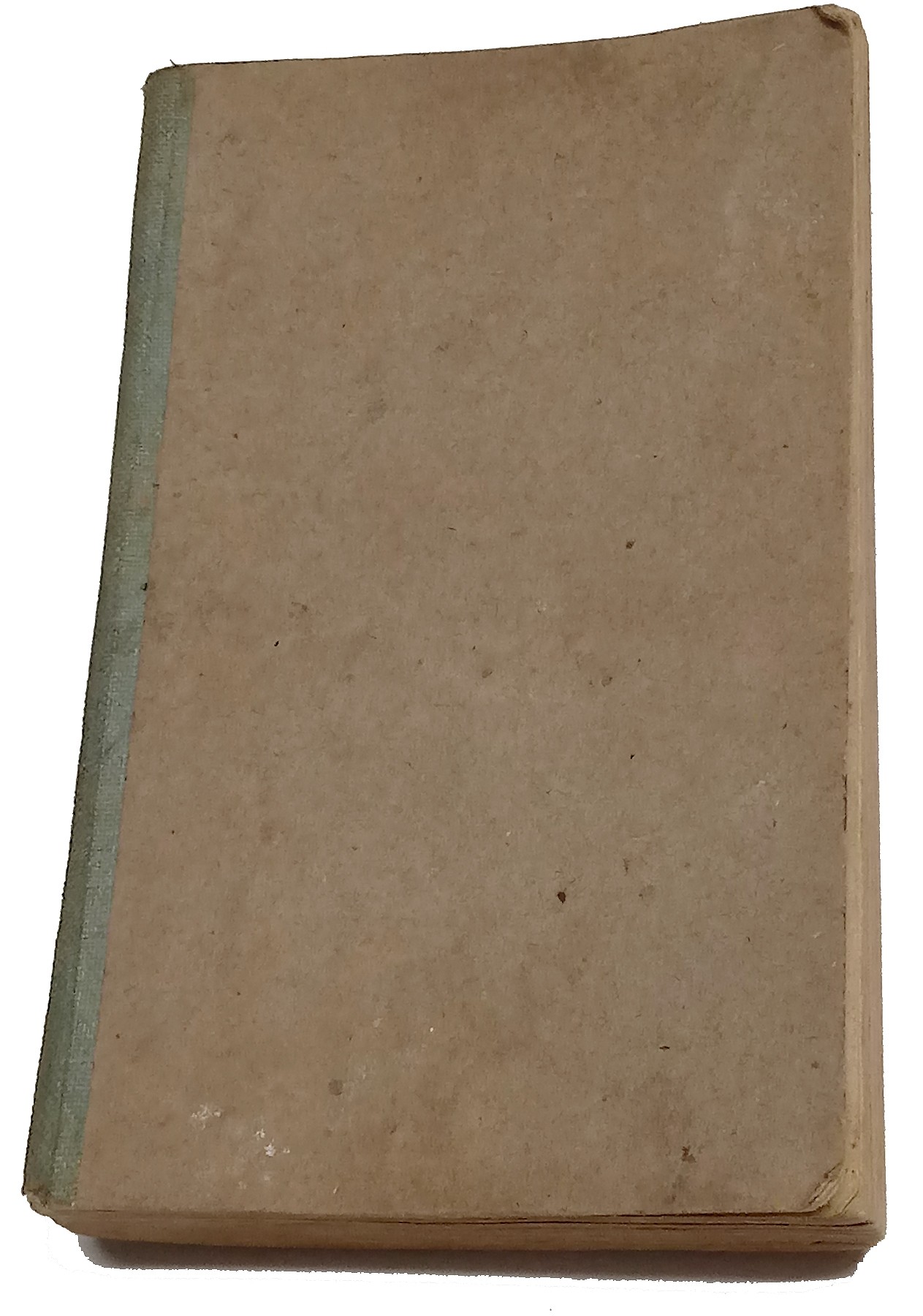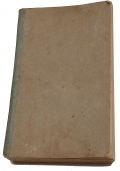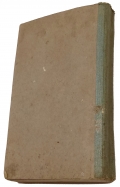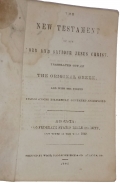site search
online catalog
RARE CONFEDERATE PUBLISHED POCKET TESTAMENT BY THE CONFEDERATE STATES BIBLE SOCIETY, AUGUSTA GA, PRINTED IN ATLANTA 1862 – PICKED UP BY CHARLES DEARING, 16TH MAINE

$3,500.00 SOLD
Originally $3,950.00
Quantity Available: None
Item Code: 766-1100
Measuring 3.25 by 5 inches, this is an extremely scarce Confederate pocket testament printed by “Wood, Hanleiter Rice & Co.” in Atlanta in 1862 for the “Confederate States Bible Society / Instituted in the Year 1862.” Like everything else in the Confederacy, bibles and testaments were in short supply. None had been printed in the south before 1861, when two firms in Nashville, TN, acquired stereotype printing plates from Philadelphia through an agent based in neutral Kentucky and began printing. After federal forces took over Nashville in early 1862 one of these sets, for the New Testament and Psalms, was smuggled out of the city and accepted by the “Bible Society of the Confederate States of America.”
That organization, a counterpart to the American Bible Society based in New York, was formed at a convention held in Augusta, GA, in March 1862, at the instigation of the South Carolina Bible Society, “to encourage the circulation of Holy Scriptures by, ‘the printing, publishing or procuring of the same.’” A contract was given to Wood, Hanleiter, Rice and Company, who ran the Franklin Printing House in Atlanta, for 50,000 copies. Shortages of binding boards prevented completion of the contract until March 1863, but there was enough paper on hand at that point to print an additional 12,000. Some included the psalms and some, like this, did not. Subsequent printing was transferred to Evans and Cogswell of Columbia, SC. This was not enough to meet demand, of course, and bibles and testaments were both run through the blockade and imported directly from the north under formal arrangements and flags of truce. Those four printings, however, are the only ones qualifying as Confederate and those printed for the CS Bible Society seem to be the first printed in Georgia at all.
This copy was brought back as a war souvenir by Charles E. Dearing, who mustered into Co. B of the 16th Maine as a corporal in August 1862, was promoted sergeant in January and first sergeant in April 1863. He was in the fighting at Fredericksburg and was captured at Gettysburg, returning to the regiment in late May 1864, in time to take part in Grant’s 1864 campaign, and served until muster out in June 1865. He sent home or brought back a number of mementos that we are pleased to offer, including several Confederate documents that were likely picked up at Petersburg or in the ruins of Richmond.
This testament is in excellent condition, far better than the few we located for sale in recent years. The board covers and cloth binding have just minor stains. The binding and text block are tight and the pages are all there. There is a very minor water stain inside at the upper edge of the binding, not showing on the exterior, some minor foxing and a small burn hole on the lower last page of text, not affecting any printing, and the rear flyleaves, but not affecting the rear cover. The covers are simple boards with a cloth binding on the spine, reflecting the biggest problem faced the publisher.
The bible was carried and used, but very well taken care of. There is a faded ink inscription inside the front cover and on the flyleaf that might be made out with some careful camera work or black lighting. Confederate imprints are rare in any case. Pocket bibles were handed to many departing volunteers both north and south by family, friends, well-wishers, patriotic and charitable associations. This is a very scarce imprint on its own and an excellent example of a testament printed specifically for carry in the field. [sr]
GENEALOGICAL NOTES
Charles Edwin Dearing was born 30 October 1838 in Webster, Maine, one of eight children born to John (b. ca. 1798) and Caroline Perry Dearing 9 (b. 1806.) John was a stage driver. The union produced 8 children: Joseph H. (born ca. 1832, ) George G. 1834,) Albert Lincoln (ca. 1836,) Charles E. (1838,) John F. (ca. 1840,) Susan E. (ca. 1842,) Laura S. (ca. 1845,) and Bradford P. (ca. 1848.)
John Dearing (Sr.) died 27 September 1847 and the family thereafter is found listed in household of son Joseph H. Dearing in Webster, listed as a farmer. George is not listed in the household in 1850 and presumably is on his own by then. The farm may have been the family homestead, inherited by Joseph as eldest son. George shows up in 1863 in Thanksgiving letter to Charles, a reference in Albert’s (Lincoln’s) letter to Charles, and in reports of Caroline’s 1863 remarriage at “the home of her son George.”
At age ten (about 1848) Charles was sent to Gardiner, ME, to live with his maternal uncle Joseph Perry, a machinist, and train in that profession. In the 1850 census he is listed both in Webster (in the Perry household) and in Gardiner. “After attaining his majority,” presumably ca. 1856, Charles moved to Boston, but returned to Gardiner to manage his uncle’s machine shop and is there by the time of the 1860 census. He is listed in Webster in Joseph’s household, but also seems to have had lodging in Gardiner, where appears as machinist, age 22, in the household of Henry Foy.
By 1860 Joseph had married (Susan V. Dearing) and had one son (John L. Dearing.) Albert L. had served briefly in the U.S. Army, but had been discharged and was again at home. George is on his own. John F. is not listed. Some secondary sources indicate he died 5 October 1858. An 1863 Thanksgiving letter to Charles from the family indicates two family members were absent: Charles and another male member of the family who had died (John L., son of Joseph H., was still alive in 1870.)
Caroline Perry Dearing remarried in April 1863. Her second husband was Willis Sprague, a deacon, one-time state senator, and resident of Topsham. The family’s 1863 letter to Charles referring to “Father” must mean Sprague. The letter is being written from the “old homestead” in Gardiner and Caroline is referred to as “a visitor.” Willis Sprague dies in 1867 or 1869 and by the 1870 census Caroline is once again in the household of Joseph H. in Gardiner. She dies in 1882 at age 76.
Albert Lincoln Dearing served in the 5th Maine, reaching the rank of Captain. He was seriously wounded at Second Fredericksburg (Sedgwick’s attack during the Chancellorsville campaign,) and discharged in 9/8/1863.
CHARLES E. DEARING SERVICE NOTES
Charles E. Dearing was a machinist when he enlisted 26 July 1862 at age 24 and mustered into Co. B 16th Maine on 14 August 1862 as a corporal. The regiment moved to Washington and in October was assigned to the First Army Corps of the Army of the Potomac.
Dearing is recorded as promoted from corporal to fifth sergeant as of 1 January 1863, likely in the wake of the regiment’s losses at Fredericksburg. They had been heavily engaged on the Union left, where Federal attacks had some initial success, and Dearing himself was struck by a spent ball that pierced his cap box and belt, but lodged in his clothing. He was promoted again, to company first sergeant to date March 15, 1863.
On July 1, as part of Robinson’s Division of the First Corps, the 16th Maine was deployed with the rest of Paul’s brigade to reinforce Baxter’s brigade along Oak Ridge (the two brigades constituting Robinson’s division.) After three hours of fighting against Confederate attacks from the west and north, the collapse of the Eleventh Corps opened them up to attacks from the northeast as well. The regiment had found itself at the apex of Robinson’s line as regiments to its right bent back to face north, and they were now ordered to advance to a hill commanding the Mummasburg Road and buy the division time to withdraw. By the time they themselves pulled back their retreat had been cut off and the survivors were compelled to surrender near the railroad cut. The battlefield monument records that of 275 engaged 11 were killed, 63 wounded, and 159 were captured. Their proportional loss may have been higher: their official report says only 248 entered the fight. As Confederates pressed in to gather prisoners, the men tore apart the regiment’s colors rather than surrender them. Shreds and fragments were concealed on their persons and later sent home as mementos. One of these exists in Dearing’s effects, along with an undated letter sending it to his mother. He seems to have sent two to family members: a reference by a sister-in-law in the family’s Thanksgiving 1863 letter to Charles indicates she had received a piece, so he likely sent both pieces to the family before November 26 and after September 29, 1863.
Dearing chronicled his battle experience and thirteen weeks in captivity in a letter home to his mother. He was marched south to Staunton, VA, from July 4 to July 18, and sent from there to Richmond by train. He reached Richmond on July 20, spent some time in Tobacco Warehouse (“opposite Castle Thunder,”) and was then transferred to Belle Isle. He was released on parole at City Point on September 29 and was sent to Camp Parole at Annapolis to await exchange. He received a 30-day furlough home from April 15 to May 15, 1864. His diary chronicles his trip from Maine starting May 12 and mentons receiving news he had been exchanged. At Camp Parole he was placed in charge of a company formed of men heading back to their regiments. This was designated “1st Company 3rd Battalion.” Reaching Washington and crossing into Virginia, Dearing (and presumably the rest of the company) received arms and equipment at a point of “Distribution” and then marched to rejoin the army at the front. Dearing rejoined the 16th Maine on June 6.
During his absence the First Corps had been dissolved and the regiment transferred to the Fifth Corps, which was heavily involved the fighting of Grant’s Overland Campaign against Richmond. They had fought and taken losses at Wilderness and Spottsylvania. He was there in time for Cold Harbor in June, and the first fighting at Petersburg. In August he was with them in the fighting at the Weldon Railroad and was reportedly briefly captured before escaping back to the regiment. He was promoted to regimental Quartermaster Sergeant 12/14/64. The regiment saw further action during the siege of Petersburg, Hatcher’s Run, the Weldon Railroad again and at Five Forks.
Dearing was discharged with the regiment at Arlington Heights June 5, 1865, and returned home to manage his uncle’s machine shop again. They were eventually partners in the operation, but in 1887 Dearing turned to agriculture for health reasons and moved to Farmingdale. He served in several civic posts in Gardiner and Farmingdale, and was a charter member of Heath Post G.A.R. In 1869 he married Emily White (1844-1920.) They had three children, two of whom survived to adulthood. Emily died in 1920. Charles died in 1930 at age 91.
~~~~~~~~~~~~~~~~~~~~~~~~~~~~~~~~~~~
THIS ITEM, AS WITH ALL OTHER ITEMS AVAILABLE ON OUR WEB SITE,
MAY BE PURCHASED THROUGH OUR LAYAWAY PROGRAM.
FOR OUR POLICIES AND TERMS,
CLICK ON ‘CONTACT US’ AT THE TOP OF ANY PAGE ON THE SITE,
THEN ON ‘LAYAWAY POLICY’.
THANK YOU!
Inquire About RARE CONFEDERATE PUBLISHED POCKET TESTAMENT BY THE CONFEDERATE STATES BIBLE SOCIETY, AUGUSTA GA, PRINTED IN ATLANTA 1862 – PICKED UP BY CHARLES DEARING, 16TH MAINE
For inquiries, please email us at [email protected]
Most Popular
Historical Firearms Stolen From The National Civil War Museum In Harrisburg, Pa »
Theft From Gravesite Of Gen. John Reynolds »
Cavalry Carbine Sling Swivel »
Fine Condition Brass Infantry Bugle Insignia »
featured item
ENGRAVED GOLD 20th CONNECTICUT REGIMENTAL BADGE WITH BATTLE HONORS OF LT. OLIVER TAYLOR DOOLITTLE
This is a beautiful gold, engraved and identified regimental badge of the 20th Connecticut, which fought in the Army of the Potomac and Army of the Cumberland, seeing action at Chancellorsville, Gettysburg, the Atlanta Campaign, the March to the Sea,… (622-434). Learn More »









